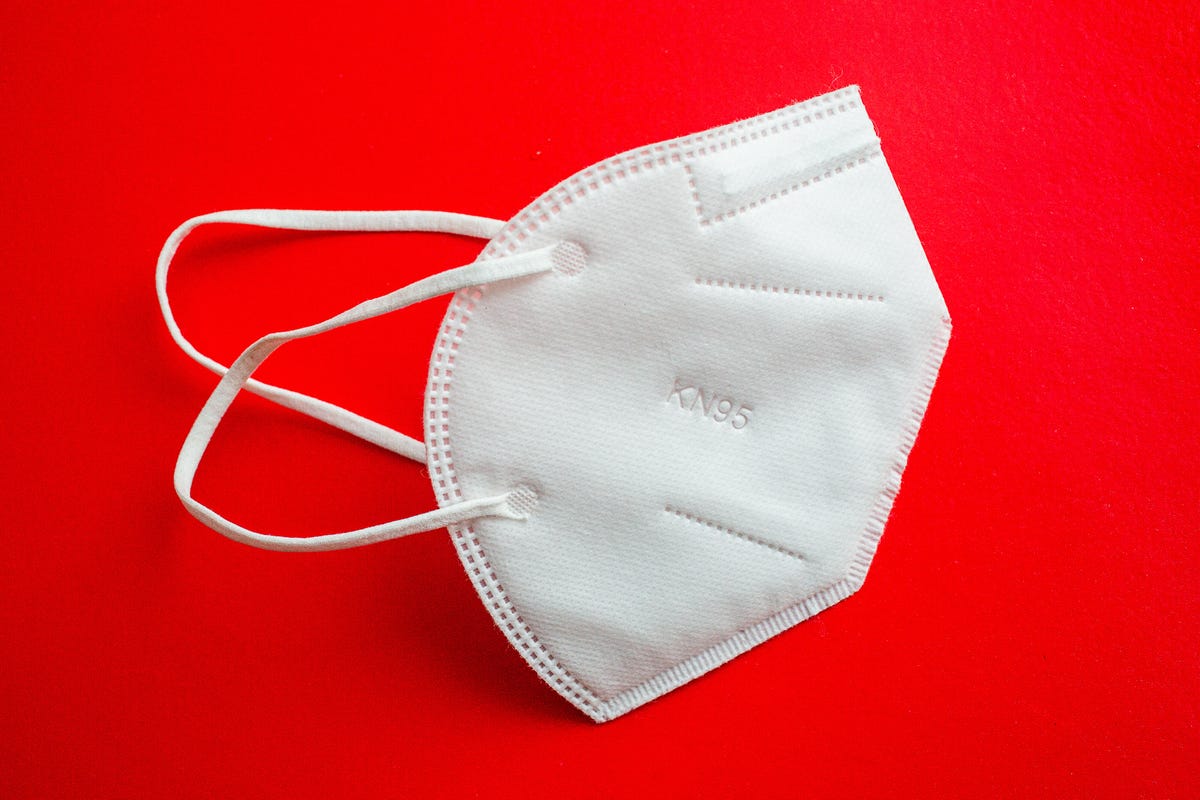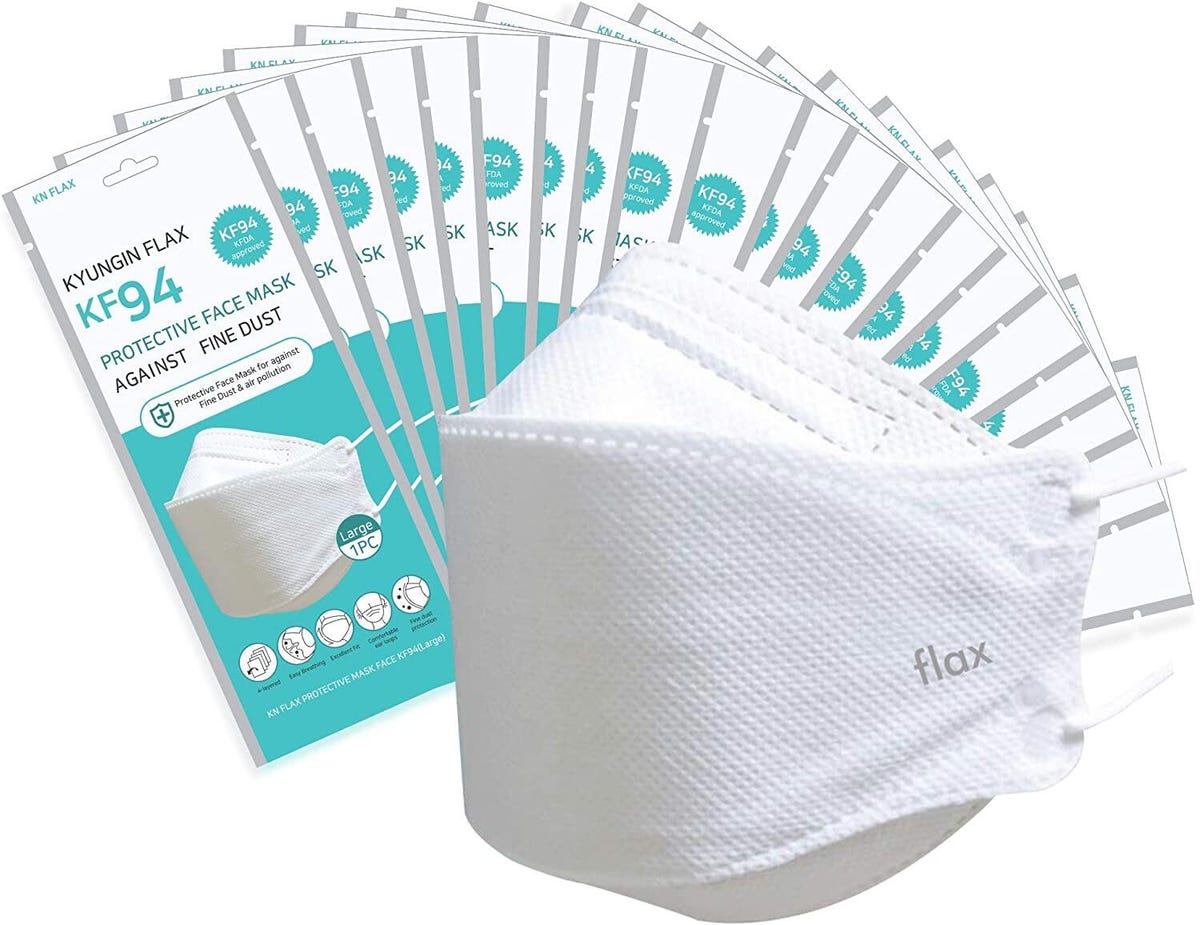N95, KN95 and KF94 Masks: What’s the Difference?
Two years into the pandemic, face masks are still a part of daily life, something most of us never imagined in February 2020. And amid more contagious COVID-19 variants like omicron, wearing a high-quality face mask is more important than ever to slow the spread.
We already know that all face masks aren’t equal, and there’s a difference between medical-grade respirators and cloth face coverings. Now as the pandemic drags on, high-filtration respirators like N95s are gaining attention again, especially because they can filter out particles far better than a cloth or surgical mask.
This guide compares N95 masks, KN95 masks and KF94 masks — three popular and protective types of mask — to help you make smart mask-buying and mask-wearing decisions. Note that the Centers for Disease Control and Prevention is currently in the midst of updating its mask guidance. We’ll update this article as we learn more.
An N95 mask.
Getty Images
- Percentage of aerosol particulates filtered: 95%
- NIOSH-approved: Yes
- Who should wear one: Anyone who wants to maximize protection from the ultra-contagious omicron variant. N95s labeled “surgical” should be reserved for health care workers.
N95 masks have been popular since the early stages of the pandemic in 2020. These masks are designed to create an extremely tight seal around the nose and mouth, thanks to elastic headbands and an adjustable metal band over the nose. That’s part of what makes them so effective (health care workers are individually fitted for their N95 respirators).
The other thing that makes N95s effective? They filter 95% of particles as small as 0.3 microns in size, hence the 95 in the name. (Although SARS-CoV-2 virus particles are about 0.1 microns in size by themselves, remember that virus particles are usually attached to something bigger, like the respiratory droplets generated when talking.)
N95s undergo the rigorous inspection and certification set forth by the National Institute for Occupational Safety and Health. Those that are intended to be used in medical settings must also be approved by the US Food and Drug Administration for that purpose. A study in the Journal of the American Medical Association calls N95s the “mainstay of protection against airborne pathogens.”
N95s are not in short supply like they were in the early days of the pandemic, so they’re available for the general public to use, if you can get your hands on one. The CDC has said that “when supplies are available, individuals may choose to use a basic disposable N95 respirator for personal use.”
There is, however, a difference between standard N95s and those specifically labeled “surgical.” The latter should still be prioritized for health care workers, the CDC says, while the former can be used by anyone.

A KN95 mask.
Sarah Tew/CNET
- Percentage of aerosol particulates filtered: 95% (but see below)
- NIOSH-approved: No
- Who should wear one: Anyone who wants to maximize protection from the ultra-contagious omicron variant.
KN95 masks are considered the Chinese equivalent of N95 masks. They feature a tentlike shape that creates a little pocket of air between your nose and the fabric, which makes them appealing to many people: They feel somewhat easier to breathe through, less obstructive and stifling than N95s.
However, because KN95 masks aren’t overseen by the mask-regulating body in the US, NIOSH (they’re regulated by the Chinese government instead), it can be trickier to find reliable brands here. Amid high demand for respirators, many KN95s on the market are now fraudulent or counterfeit models — roughly 60% of KN95s are fakes that do not meet NIOSH standards, according to the CDC.
The FDA granted emergency use authorization to several KN95 masks earlier in the pandemic, when N95s were in short supply. And while that emergency use authorization has since been revoked, the FDA’s list is still a helpful source for finding manufacturers that are reputable.
Even KN95 masks that don’t meet NIOSH standards for filtration efficacy are probably still more protective than basic surgical and cloth masks — as long as they offer a tight seal, without any gaps.
Read more about where to buy reliable KN95s on CNET’s list of the best face masks.

A KF94 mask.
KN FLAX/Getty Images
- Percentage of aerosol particulates filtered: 94%
- NIOSH-approved: No
- Who should wear one: Anyone who wants to maximize protection from the ultra-contagious omicron variant.
KF94 masks have grown in popularity since the start of the pandemic. The “KF” stands for “Korean filter” and the 94 refers to the masks’ filtration efficacy. According to the South Korean government’s standards, these masks filter 94% of particles down to 0.3 microns in size.
KF94s offer an alternative fit to KN95s or N95s. They feature ear loops, an adjustable nose bridge and side flaps to create a tight fit. For some people, they’re more comfortable and easier to wear than the alternatives — unlike N95s in the US, KF94s are often worn by regular citizens in Korea.
In a very small August 2020 study (only seven people), researchers found KF94 masks to be just as effective at filtering SARS-CoV-2 as N95 masks. Unlike KN95s, KF94 masks were not granted EUA from the FDA. Still, like KN95s, KF94s are a steep upgrade from cloth or surgical masks.
You can help ensure that you’re getting the real deal by shopping brands that are manufactured in Korea, where the KF94 label is strictly regulated. Some KF94s are made in China, but these may be more likely to be counterfeits.
Fraudulent face masks have become a major problem on Amazon and other large online retailers. Manufacturers claim to be selling N95s, KN95s or KF94s, when in reality the masks they sell are not held to the same standards as masks that have undergone inspection by the US, Chinese or Korean governments. Sometimes, sellers even put an approved brand’s name on a counterfeit product, making it even harder to tell the difference.
The CDC has a running list of non-NIOSH-approved N95s, KN95s, KF94s and other protective masks that have gone through filtration testing. The list also includes known counterfeits.
It’s near-impossible to spot counterfeit masks, especially when shopping online, but you can take a few steps to ensure that you’re getting the best protection possible:
- Shop from a trusted reseller like Project N95, a nonprofit that vets personal protective equipment
- Buy from reputable retailers, such as CVS or Walgreens, which have vetting processes for wholesale products
- Look closely at seller ratings and product reviews
- Be wary of new sellers that seem to pop up out of nowhere
- Double-mask if you’re unsure of the quality of your masks
CNET also has a running list of the best face masks, including N95s, KN95s, KF94s and surgical masks.
The information contained in this article is for educational and informational purposes only and is not intended as health or medical advice. Always consult a physician or other qualified health provider regarding any questions you may have about a medical condition or health objectives.



